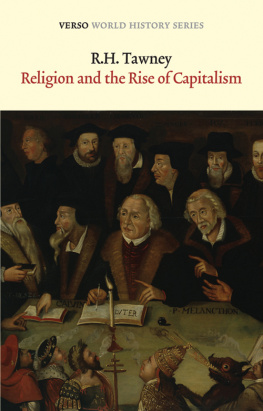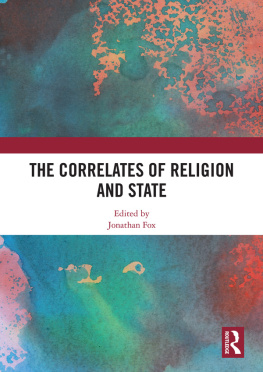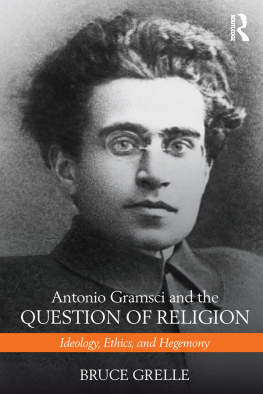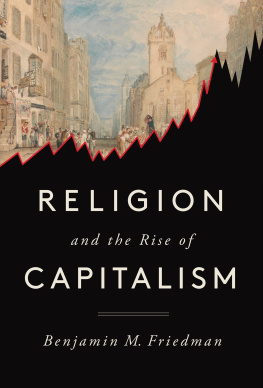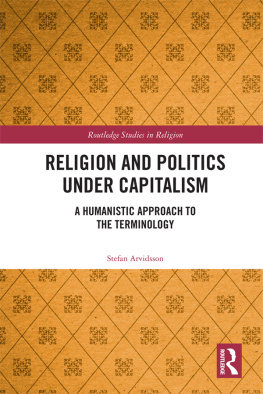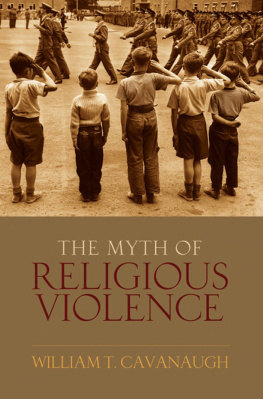RELIGION
AND THE RISE OF
CAPITALISM
A Historical Study
R. H. Tawney
With a Prefatory Note by Dr Charles Gore

Whatever the world thinks, he who hath not much meditated upon God, the human mind, and the summum bonum, may possibly make a thriving earthworm, but will most indubitably make a sorry patriot and a sorry statesman.
BISHOP BERKELEY, Siris, 350
TO
DR CHARLES GORE
WITH AFFECTION AND GRATITUDE
This paperback edition published by Verso 2015
First edition published 1926
Published by Pelican Books 1938
The estate of R. H. Tawney 1926, 2015
All rights reserved
The moral rights of the authors have been asserted
1 3 5 7 9 10 8 6 4 2
Verso
UK: 6 Meard Street, London W1F 0EG
US: 20 Jay Street, Suite 1010, Brooklyn, NY 11201
www.versobooks.com
Verso is the imprint of New Left Books
ISBN-13: 978-1-78168-110-7
eISBN-13: 978-1-78168-543-3 (UK)
eISBN-13: 978-1-78168-238-8 (US)
British Library Cataloguing in Publication Data
A catalogue record for this book is available from the British Library
Library of Congress Cataloging-in-Publication Data
A catalog record for this book is available from the Library of Congress
Printed in the US by Maple Press
CONTENTS
SINCE the appearance of this book ten years ago, the literature on its subject has considerably increased. The learned work of Troeltsch, the best introduction to the historical study of religious thought on social issues, can now be read in an English translation, as can also the articles of Weber on The Protestant Ethic and the Spirit of Capitalism. The omission from my book of any reference to post-Reformation Catholic opinion was a serious defect, which subsequent writers have done something to repair. The development of economic thought in medieval Italy; the social forces at work in the Germany of Luther, and his attitude to them; the economic doctrines of Calvin; the teaching of the Jesuits on usury and allied topics; English social policy during the Interregnum; the religious and social outlook of the French bourgeoisie of the same period; the attitude of Quakers, Wesleyans, and other bodies of English Nonconformists to the changing economic world which confronted them in the eighteenth century, have all had books devoted to them. In the somewhat lengthy list of articles on these and kindred subjects, those by the late Professor See, M. Halbwachs, and Mr Parsons, and an article by Mr Gordon Walker which has just appeared in The Economic History Review, specially deserve attention.
It will be seen, therefore, that the problems treated in the following pages, if they continue to perplex, have not ceased to arouse interest. What conclusions, if any, emerge from the discussion?
The most significant are truisms. When this book first appeared, it was possible for a friendly reviewer, writing in a serious journal, to deprecate in all gravity the employment of the term Capitalism in an historical work, as a political catch-word, betraying a sinister intention on the part of the misguided author. An innocent solecism of the kind would not, it is probable, occur so readily today. Obviously, the word Capitalism, like Feudalism and Mercantilism, is open to misuse. Obviously, the time has now come when it is more important to determine the different species of Capitalism, and the successive phases of its growth, than to continue to labour the existence of the genus. But, after more than half a century of work on the subject by scholars of half a dozen different nationalities and of every variety of political opinion, to deny that the phenomenon exists; or to suggest that, if it does exist, it is unique among human institutions, in having, like Melchizedek, existed from eternity; or to imply that, if it has a history, propriety forbids that history to be disinterred, is to run wilfully in blinkers. Verbal controversies are profitless; if an author discovers a more suitable term, by all means let him use it. He is unlikely, however, to make much of the history of Europe during the last three centuries, if, in addition to eschewing the word, he ignores the fact.
The more general realization of the role of Capitalism in history has been accomplished by a second change, which, if equally commonplace, has also, perhaps, its significance. Trade is one thing, religion is another: once advanced as an audacious novelty, the doctrine that religion and economic interests form two separate and coordinate kingdoms, of which neither, without presumption, can encroach on the other, was commonly accepted by the England of the nineteenth century with an unquestioning assurance at which its earliest exponents would have felt some embarrassment. An historian is concerned less to appraise the validity of an idea than to understand its development. The effects for good or evil of that convenient demarcation, and the forces which, in our own day, have caused the boundary to shift, need not here be discussed. Whatever its merits, its victory, it is now realized, was long in being won. The economic theories propounded by Schoolmen; the fulminations by the left wing of the Reformers against usury, land-grabbing, and extortionate prices; the appeal of hard-headed Tudor statesmen to traditional religious sanctions; the attempt of Calvin and his followers to establish an economic discipline more rigorous than that which they had overthrown; are bad evidence for practice, but good evidence for thought. All rest on the assumption that the institution of property, the transactions of the market-place, the whole fabric of society, and the whole range of its activities, stand by no absolute title, but must justify themselves at the bar of religion. All insist that Christianity has no more deadly foe than the appetitus divitiarum infinitus, the unbridled indulgence of the acquisitive appetite. Hence the claim that religion should keep its hands off business encountered, when first formulated, a great body of antithetic doctrine, embodied not only in literature and teaching, but in custom and law. It was only gradually, and after a warfare not confined to paper, that it affected the transition from the status of an odious paradox to that of an unquestioned truth.
in two articles published in 1904 and 1905. Hence it is not less natural that much of that work should, consciously or unconsciously, have had Weber as its starting point.
What exactly was the subject with which he was concerned? That question is obviously the first which should be asked, though not all his critics ask it. He was preparing to undertake the comparative study of the social outlook and influence of different religions, the incomplete results of which appeared in three volumes in 1920, under the name of Gesammelte Aufstze zur Religionssoziologie. The articles, Die protestantische Ethik und der Geist des Kapitalismus, were a first step towards that larger work, and subsequently, corrected and amplified, formed part of its first volume. Weber thought that western Christianity as a whole, and in particular certain varieties of it, which acquired an independent life as a result of the Reformation, had been more favourable to the progress of Capitalism than some other great creeds. His articles were an attempt to test that generalization.
Their scope is explained in an introduction written later to the

